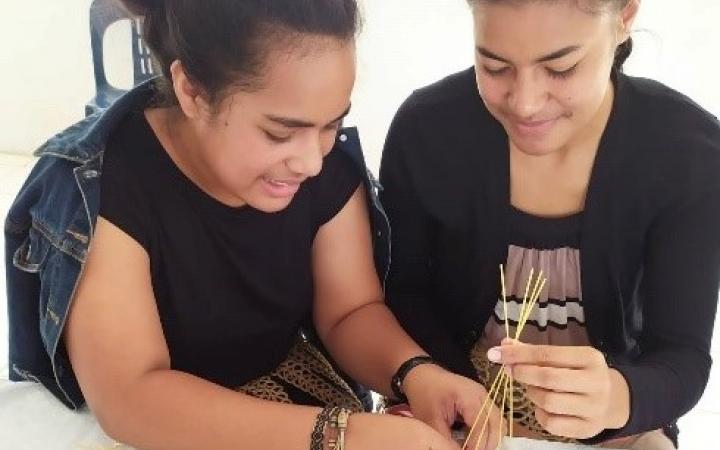When Lu’isa Uai Taunga, an officer with the National Emergency Management Office in the Kingdom of Tonga, participated in the UNITAR Disaster Risk Reduction Training which wrapped up in November 2017, she left with renewed energy and ideas for new initiatives to prepare her community in the island group of Ha’apai in the event of a disaster. “This year I changed my approach, and this is something I learned from UNITAR during my school visit where the bottom to top approach was used.” she shared with UNITAR disaster risk reduction training associate, Junko Shimazu.
She worked hard to incorporate youth in her outreach, starting with school visits that raised awareness regarding tropical cyclones and tsunamis. She taught the importance of preparing a 72-hour bag and the 72-hour bag items, which she said were the “equivalent of the Emergency Box I saw in Japan,” she remarked. This was supplemented by poetry and poster competitions in which youth competed, but Lu’isa didn’t stop there. She worked to involve the community in the competition, with “prizes were sponsored by the local businesses and Governor's Office in the island,” she reported.
Lu’isa also led a workshop training for children in class six (which are 10 to 12-year olds). She decided to hold the training since she had a realization. “I have found out during my school visits that the…message [to] adults who attend workshop do not trickle down to the children.” Students often did not know where evacuation centers were, which made them reliant on adults in the event of an emergency. Lu’isa wanted to teach and involve young students so that the community’s response time could be improved and all members of the community, including children, could work together in an emergency.
She supplemented this workshop with another youth training conducted with the Tonga Red Cross that gave youth the chance to obtain first aid skills. Youth were trained on how to evacuate vulnerable members of their communities such as elderly, heavily pregnant woman and people with disabilities. Lu’isa recognized that “in the islands, not all elderly have access to a wheelchair and neither are the communities road paved for easy evacuation.” When it came to the children Lu’isa explalined her training strategy, “what we did was…together with the help from Tonga Red Cross we gave them scenarios on evacuating members. I used readings [from UNITAR]…and simplified it to suit our island context.
Lui’sa sees the potential in working with children and educating them so that they can, in turn, educated the community. Her strengths-based approach led her to also facilitate students in writing a book for Tropical Cyclone and Tsunami with DRR messages which were then illustrated by a local Peace Corps volunteer.
“Children are taught and message will trigger upwards,” she said.
Credit: UNITAR and National Emergency Management Office/ MEIDECC Tonga


